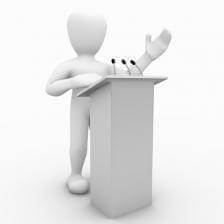What Do Actors, Politicians, and Sales Professionals Have In Common?
Jeb Blount discussed the power of scripts.

Jeb, I listened to a few of your podcasts and loved them. They are so professional. It is no wonder that your podcasts are number one in sales. One question though, you sound so much different on your podcasts than when we talk on the phone. How do you do that?
At first I became a little self-conscious about my phone voice, wondering if I somehow sounded like an idiot. But after calling my friend to clarify his question, I discovered that he just thought my voice intonation, speaking style, and flow on the podcast sounded really professional. Instantly I realized that the only difference between the podcast and our regular phone conversations was a script. When I record a podcast I work off of a prepared script which usually takes three to four hours to write and rehearse. And while that may seem like a lot of preparation for a five minute podcast, it pays off by giving us a professional sounding audio program that delivers the message we intend. I also use a script when I deliver keynote speeches, sales trainings, make cold calls, and on sales presentations. In fact, whenever I want to be perceived by my audience as competent and professional, I build and practice a script.
Scripts will do the same for you. They will make you sound more professional and knowledgeable on the phone and in person. Scripts also have the added benefit of freeing your mind to focus on your message and your audience rather than the words you use. And scripts work so well in sales because we have many repetitive activities like, cold calling, appointment setting, follow-up calls, elevator speeches, product demos, questioning, presentations, overcoming objections, and closes.
If you really want to observe the power of scripts just notice the difference in your favorite movie or TV stars when they speak with and without scripts. You will notice when they are in a scene, working from a script, they are incredibly convincing as their character. But without a script they stumble on their words, and make many of the same mistakes we make, in normal conversation. Scripts are what make them stars and compelling personalities. Or, consider politics. On the campaign trail politicians use a script. As long as they stay on script and on message things go smoothly, but as soon as they get off script the press pounces and the results can be devastating.
However, when I stand in front of a group of salespeople and utter the word, “script,” the first thing I usually hear is groans. In the face of the overwhelming evidence that scripts work in sales, most sales people reject them off hand.
I hear all of the regular excuses, including my favorite, “I don’t sound like myself when I use a script.”
To that I answer, “good, that is the whole point. The primary objective of the script is to make you sound different and to project a professional message.”
The rebuttal is always the same, “but you don’t understand Jeb, I’ll sound canned.”
The fear of sounding canned is legitimate. If I sounded canned on this podcast you would tune out, and if actors and politicians sounded canned, TV shows and movies wouldn’t be entertaining and speeches wouldn’t be believable. But that is exactly why actors, politicians, and top sales professionals rehearse and practice. They work and work until the script sounds natural and becomes their voice.
This is what most sales people don’t get. Whether it is a big presentation or a routine call to set an appointment, the words that come out of your mouth must be practiced to make the best impression on your prospect or customer. Scripts are a powerful way to manage your message but they must be rehearsed.
When salespeople complain that scripts make them sound canned, what they are really saying is, “I’m too lazy, or I don’t care enough about my own success to take time to write my script and rehearse it.” They are willing to shoot from the hip and bet their quota and income, on the roll of the dice. Sadly, this is the exact reason that the top 20% of sales professionals make 80% of the commissions. They are simply willing to do the things that average salespeople are unwilling to do.
The question you should ask yourself is, “Am I committed to being my best?” If the answer is yes then you will make the time to create scripts for all of your activities. I won’t feed you a line and tell you this will be easy because it won’t. Writing and practicing scripts will require you to think and be time consuming. The good news is you are already using scripts for some of your sales activities – you already have the habit of saying certain things certain ways. The first step is to analyze what you are already doing and formalize what is working into a script that can be repeated with success, time and again. There are also a number of books and resources available to help you including one of my recent favorites, a book called “The Real Secrets of the Top 20%” by Mike Brooks.
As you prepare your scripts, practice and perfect them. Use a recorder, a role play buddy, or coach to help you rehearse. Over time, your scripts will become second nature, your confidence will improve, your income will increase, and you will move into the ranks of the elite Sales Professionals.
Image courtesy of Shutterstock
